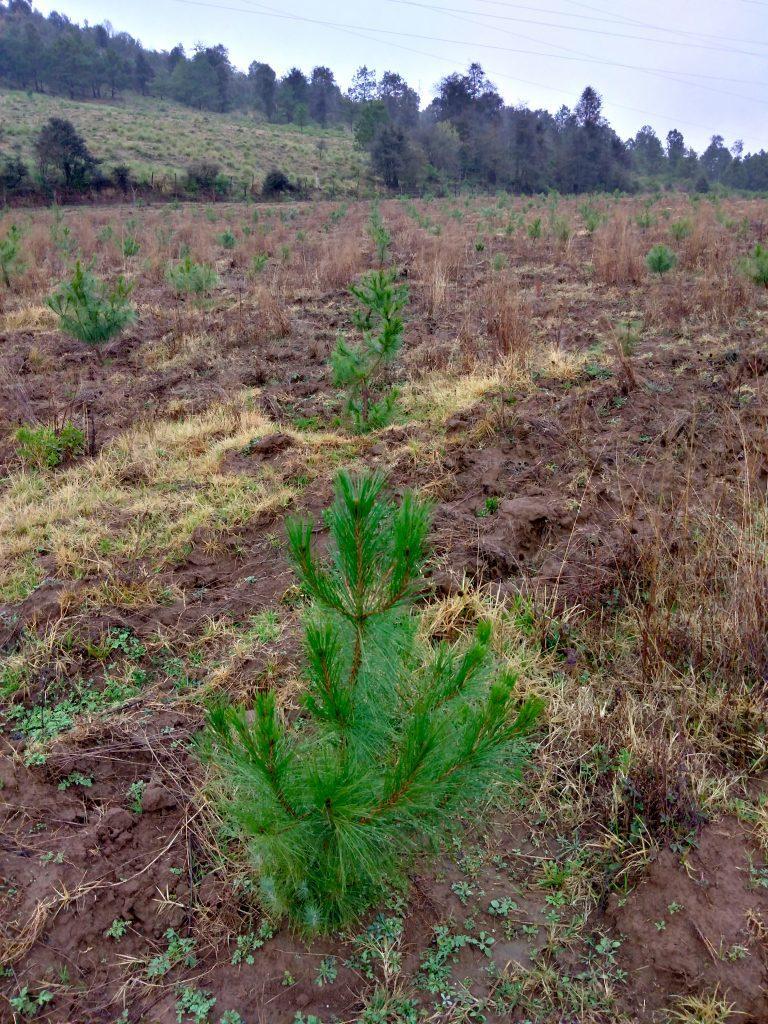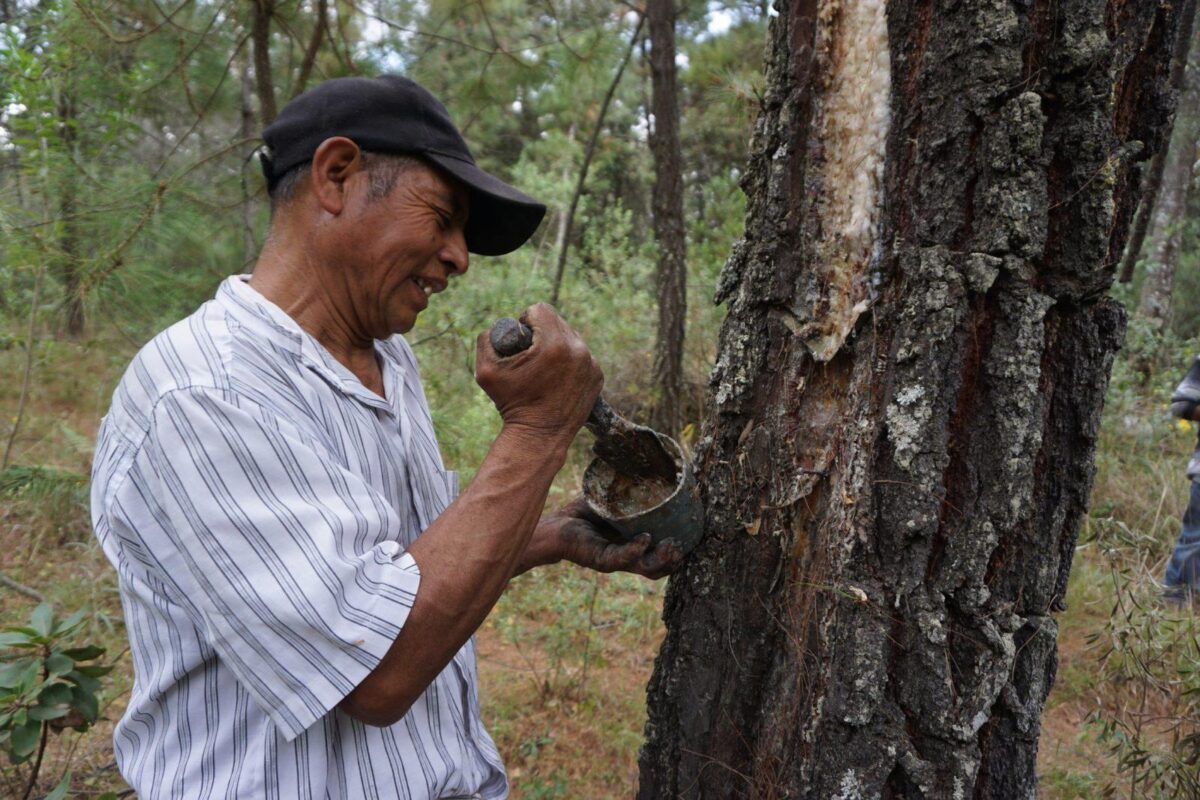Ejido Verde‘s CEO Shaun Paul is as passionate about creating a sustainable business model as he is about creating a successful business. Deep in Mexico’s forests, Ejido Verde represents one of the Pinosa Group’s many pine resin chemical companies, where pine trees are harvested to create a resin used in various products like sealants and glues. Today, the industry’s sustainability efforts rely as much on regeneration as they do on cutting down on carbon emissions, and we spoke with Ejido Verde’s CEO, Shaun Paul, to learn why.
Grit Daily: What’s behind the Ejido Verde name?
Shaun Paul: “Ejido” is a uniquely Mexican concept introduced 100 years ago with the Mexican revolution that assigns land rights collectively to agrarian settlements. As a mission-driven, for-profit company, Ejido Verde’s regenerative agro-forestry model provides environmentally beneficial solutions, as well as creates transformative wealth for indigenous, autonomous, land-owning communities (known as “Ejidos”). This model of land ownership sought to protect land rights of small scale landowners where the selling of land is strongly discouraged. Today, 51% of Mexicans live in these Ejidos. “Verde” is the Spanish word for green. Thus, in English, our name can loosely be translated as “Green Community.”
With this name, we seek to capture our social objective to generate prosperity for forest communities in Mexico by establishing commercial forestry plantations to harvest pine resin.
Ejido Verde is the newest addition to Pinosa Group, Mexico’s largest pine chemicals company. With a 90-year legacy as a family-owned business, Pinosa Group represents 50% of the Mexican pine resin market. Pinosa Group launched Ejido Verde in 2009 as an experimental social reforestation initiative and formalized the business in 2016.
GD: What makes a business regenerative?

Shaun Paul: Ejido Verde is a leading “regenerative” business, which means it is not only sustainable but also regenerates our planet’s resources. The trees we plant now will create revenue and jobs for three generations. Regeneration, what some call a “step-change beyond simple ‘sustainability,’ aims not only to preserve and restore but also generate new value, new life, and new higher orders of complexity within living systems.” We are among these “regenerative” companies creating ways to fund environmental restoration, climate action, and improved livelihoods for Indigenous People suffering from ecological and economic injustice.
As a framework for regenerative business, I developed the Regenerative Dashboard. We measure and manage performance differently with this methodology to boost the performance of business and investments using indicators to engage stakeholders in learning and adapting guided by regenerative principles and living systems thinking.
GD: And for the uninitiated what is “pine resin?”
Shaun Paul: Pine resin, also known as oleoresin, is the harvested tree sap of a pine tree, processed into gum rosin and turpentine, which are internationally traded commodities with a volume of 2.3 million metric tons, equivalent to cacao. It’s a $10-billion global industry in which Mexico is one of the top five producers. Historically, China dominated the markets, once accounting for 70% of global exports of gum rosin. However, deforestation, lack of replanting, overly aggressive pine tree tapping, and increased labor costs have reduced China’s role in this market to that of a net importer.
Our aim is to create a high-quality, consistent, tapped oleoresin supply for guaranteed buyers that are Mexican biorefineries. This non-exploitative economic relationship sets new standards by directly partnering with rural and Indigenous resin tapping communities. We also aim to influence the global pine chemical industry, which includes 800,000 tappers, to adopt more sustainable business practices over the next 20 years.
Through our community lending, community building, and commercial agroforestry plantation models, Ejido Verde provides the expertise to ensure the raw materials required for these Mexican biorefineries to scale and maximize production capacity. In return, Ejido Verde gets paid a commission on the resin it brings to industry and creates jobs, living wages, and climate change mitigation and adaptation solutions for the rural and Indigenous communities of Mexico.
Pine resin today has hundreds of commercial applications and includes food preservatives, food flavoring, food glazing, cholesterol-reducing food additives, pharmaceutical medicines, vitamin intermediates, biodegradable plastics, mouth wash, chewing gum, carbonated beverages, soft drinks, wine, soaps, cleansers, disinfectants, hair removal, post-its, clothing (make fabric supple), shoe glue, ballpoint pens, paint, ink, print magazines, scotch tape, duck tape, perfume, fragrances, incense, body lotion, shampoo, lip balm, hand save, furniture glue, wood finishes, varnishes, pine oil, biofuel, sealant (waterproofing), glue, furniture glue, and solvent, coatings, paint thinner, massage oils, flypaper, fiberglass, sculpture medium, emulsifier, surfactant, rheumatism medicine, burns & soars, eczema, stimulant, diuretic, laxative, cough and cold remedy, cancer treatment, antiseptic, anti-inflammatory medicine, blood pressure reduction, string instruments, glove grip, and dance shoes, among others. Today, tree resin is used across the globe for more than 5,000 purposes, which also include cover for bowling balls and stereo lithography. The pine resin sourced by Ejido Verde is used in 50 products sold into 12 industries globally.
GD: What is the relationship between a tree’s life and tapping it?
Shaun Paul: In Mexico, trees are traditionally tapped for pine resin without harming the tree. Thus a tree grows for its natural life (80-100 years) while being tapped for pine resin after its first ten years of living. In other parts of the world, trees are tapped for resin for a few years and then felled for timber. There are three different methods of getting pine resin derivatives: papermaking, tapping live trees, and wood stumps. Papermaking and pulping manufacturing processes produce crude tall oil and crude sulfate turpentine. Tapping, the only method utilized by Ejido Verde, produced “oleoresin” or resin from living trees. While there are 5,000 aforementioned purposes for tree resin, Ejido Verde mainly produces food-grade gum rosin derivatives, modified as tackifiers and softeners in chewing gum, as well as in packaging applications with direct food contact. Applications as emulsifiers are used in carbonated beverages.
Per the standards for responsible forest management established by the Forest Stewardship Council, Ejido Verde’s commercial agroforestry plantation design contributes to the regeneration of biodiverse habitats. The long-term environmental effects of reforestation have three main impacts: carbon sequestration; aquifer replenishment; and habitat connectivity, which enhances the security and health of native wildlife.
GD: Why focus on reforestation in Mexico, specifically?
Shaun Paul: Of the 13 pine species used globally for commercial resin production, six are native to Central Mexico, including Michoacán. Beginning in 2009, Ejido Verde began experimenting with a variety of ways to plant trees for resin tapping that included restoring degraded landscapes, enriching degraded natural forests, and establishing commercial plantations. Driven by a market opportunity for pine resin, and a desire to create a business model appropriate for Michoacán that has some of the best resin producing tree species in the world, Ejido Verde was born.
Opportunistically, the global demand for resin derivatives has grown steadily for decades; however, global deforestation has been a driver of diminishing supply. This is the case in Mexico, which now produces one-third as much resin as 60 years ago. In turn, there has been a contraction of refinery operations, and working refineries are currently under-utilized.
Currently operating at 30% capacity, processing 12,000 tons of resin per year, Pinosa Group’s loyal suppliers are aging and facing attrition. In 2017, Pinosa Group bought only 12,000 tons of resin from local producers, while at full capacity it could process over 40,000 tons annually.
The opportunity centers on Pinosa Group’s extensive history in the market that seeks to increase and assure its raw materials from local sources to assure the resilience and growth of the industry where more than 90% of Mexico’s pine resin historically comes from Michoacán.
Overall, it’s not necessarily about reforestation in Mexico specifically, but it’s a combination of everything we are doing collectively to innovate climate crisis and wealth inequality solutions. In essence, we are a leading sustainable pine-resin company positioned to become a lead supplier in the $10-billion global pine chemicals industry in partnership with rural and Indigenous Mexican communities. We are on track to produce $1 billion in transformative wealth for the rural and Indigenous People of Michoacán, Mexico, over the next 20 years. Last year alone, on average, every day, Ejido Verde planted 6,000 native trees that restored degraded lands, removed 100 tons of carbon from the atmosphere, and created one new living wage job for people to steward new forests in their community. We are proud to share our experience growing a new model for regenerative business and hope to inspire others to adopt regenerative principles at a time when the world needs them most.

